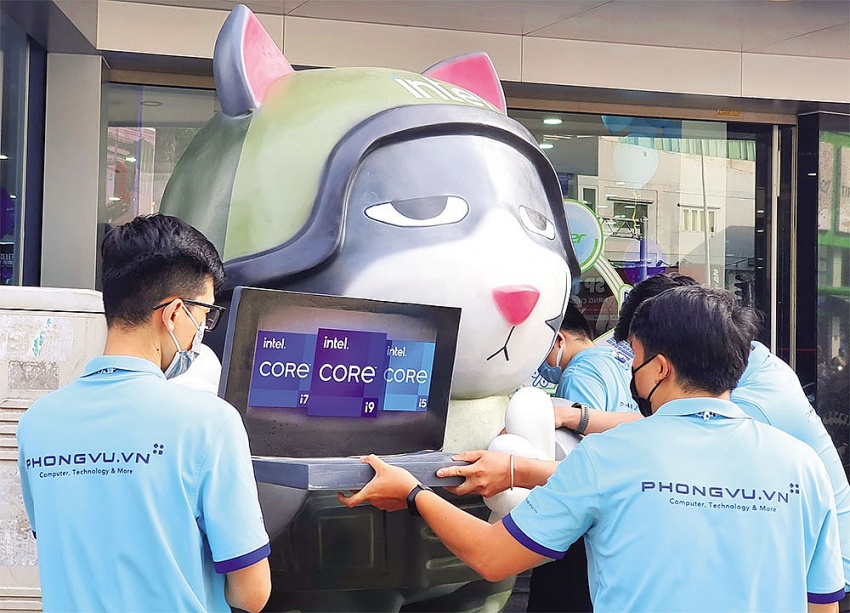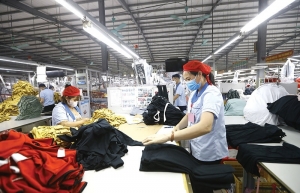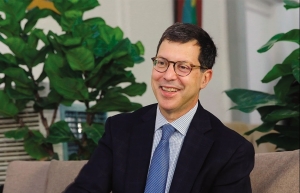Anticipating a sunny outlook for US-Vietnam investment
 |
| Adam Sitkoff, chief executive of the American Chamber of Commerce in Hanoi |
The US is a key trading partner and investor for Vietnam, and great changes have taken place in the development of the American business community here. Soon after the resumption of economic relations, a small group of Americans founded the American Chamber of Commerce (AmCham) at its first meeting at the Dragon Hotel near West Lake in 1994. This was around the same time that Amazon was founded and Justin Bieber was taking his first breaths.
AmCham then began holding small monthly meetings on the top floor of the Army Hotel in Hanoi. AmCham organised many activities for members of the community in those early days including lunches with visiting government officials, softball games, a traditional Thanksgiving holiday dinner in the former conference hall of the Metropole Hotel, and the first American Independence Day celebration in over 40 years held in Hanoi.
Business started slowly back then, but has soared in recent years. In 1995, bilateral trade was just $451 million. Last year’s volume surpassed $110 billion, and US companies have contributed significantly to the transformation and growth of Vietnam’s economy.
AmCham now represents more than 650 corporate and 2,500 individual business representatives throughout Vietnam, accounting for billions of US dollars in foreign investment, tens of thousands of direct employees, hundreds of thousands of indirect employees, and a significant share of Vietnam’s exports and tax revenues.
Boosting relations
US companies and investors bring high-quality products and state-of-the-art technologies, services, and business practices to Vietnam. We partner with Vietnam to develop high-tech, innovative industries. We commit to upholding Vietnam’s labour and environment laws, and to being good corporate citizens. Our companies are leaders in promoting sustainability and innovation in Vietnam through global business practices that ensure responsible supply chains and combat climate change.
We want to partner to develop infrastructure that ensures energy security and facilitates sustainable growth. We share an interest in developing a globally competitive workforce, creating quality jobs, and investing in the professional development of our Vietnamese team members. The US business community is optimistic about Vietnam’s prospects for continued strong economic growth in 2022 and beyond, despite global headwinds. Vietnam has done an extremely effective job at managing global challenges – from the continuing pandemic, sharp downturn in the global economy, and inflation in key inputs. Its comprehensive, consistent vaccine rollout and pragmatic reopening positioned Vietnam for a resilient recovery.
Its timely adjustment to petroleum prices and pauses on new taxes and fees have also helped tamp down inflationary concerns. Vietnam deserves much credit for enabling a stable macroeconomic environment, high GDP growth, and low inflation, as well as fiscal prudence with one of the lowest government debt-to-GDP ratios in the world.
Vietnam has continued to focus on economic integration, with membership in the Comprehensive and Progressive Agreement for Trans-Pacific Partnership, the Regional Comprehensive Economic Partnership, and the new Indo-Pacific Economic Framework in addition to other regional and bilateral free trade agreements. This increases its economic independence and attractiveness as a destination for American investment as many companies seek to diversify their global supply chains.
However, the slowdown in the global economy and shift in consumer preference from purchases of goods to services, especially in the United States, is causing a downturn in consumer demand for Vietnamese-made products. It will be important for Vietnam to continue to invest in needed infrastructure to support sustainable growth, diversify its economy to increase the role played by the digital economy and services, and ensure that its workforce remains globally competitive.
AmCham looks forward to partnering with the government to navigate these challenges and improve business conditions that strengthen the private sector, ensure sustainable economic and social development, and promote prosperity here.
AmCham appreciated the government’s actions that extended, postponed, and exempted taxes to support businesses and citizens during the pandemic, especially the resolution in January on monetary and fiscal policy which lowered Vietnam’s VAT from 10 to 8 per cent for certain goods and services.
While we recognise new taxes and fees may be needed in the future, their impact should be considered carefully to ensure they support business recovery and do not undermine economic growth. For example, a tax increase or expansion, including the special consumption tax, would have a particularly severe impact on companies seriously affected by the pandemic, such as the beverage and hospitality industries.
 |
| Intel has been one of the biggest beneficiaries of Vietnam’s early integration period in past decades, Le Toan |
Removing obstructions
American companies and investors support efforts to create a modern economy that will attract future investment and high-paying jobs for Vietnamese people. For Vietnam to be successful, the country’s regulatory framework must be stable and predictable. AmCham members remain concerned with changes in policy and regulations which are not consistent with international best practices – frequently seen in the digital economy space, for example.
Our members are keen to work with the government and relevant ministries to ensure the regulatory environment supports digital transformation and does not present unnecessary or overly burdensome requirements that would limit growth in this vital sector.
We encourage continuous improvements in infrastructure development – including realistic energy plans – protection of intellectual property, education reform, legal and tax policy certainty, and enhanced transparency in Vietnam. Progress in these areas will not only help attract more foreign investment but will also will support Vietnam’s aspirations to propel itself to the next sphere of economic competitiveness.
We believe the most important factor for a favourable investment climate is a fair, predictable, and streamlined regulatory environment that values innovation – not only to attract new investment but also to maintain and grow the investment already here. Facilitating prompt approvals of business licenses and investments, including unfreezing real estate development, is key.
Greater use of e-government and e-approvals would also be a big step forward. There is no doubt that existing investors expanding operations is the best advertisement to attract new investment.
We want to see more American business people and investors coming to Vietnam. Unfortunately, there is still uncertainty over the conditions and applications for work permits for foreigners coming to work in Vietnam. The application guidelines are guided by Decree No.152/2020/ND-CP on foreigners working in Vietnam and Resolution No.105/NQ-CP on pandemic support, which was a temporary measure during the pandemic peak.
Businesses are concerned about when Resolution 105 will expire and if it will be replaced by permanent lawful guidance. In addition, we frequently hear from companies that different provinces have different practices for reviewing and approving work permit applications. This causes difficulties for businesses with a commercial presence outside of Hanoi and Ho Chi Minh City.
Procedures have also changed for immigration here. The e-visa scheme and visa exemption scheme are granted to passport holders of certain countries only. Our goal is to attract more investment to Vietnam and that often requires companies to send foreigners here to meet with partners and make investment decisions.
In many cases, these foreign entities are planning to establish a commercial presence in Vietnam and do not yet have a sponsor to obtain a visa for their foreign employees to visit Vietnam. We know there must be a better solution to facilitate necessary business travel here.
As major investors, American companies have an interest in Vietnam’s continued success. The issues raised here highlight our belief that the business climate can best be helped by actions that increase productivity and reduce the costs and risks of doing business in Vietnam.
More importantly, decreasing the cost and complication of doing business will benefit Vietnamese-owned businesses – many of which are small businesses – and will spur entrepreneurship which will ensure Vietnam’s future competitiveness and growth.
AmCham will continue to work on lowering barriers to trade, help the Vietnamese government make it easier to do business, and create a high-standard, transparent, and stable business environment to ensure that all investors have a fair chance to succeed.
 | Special summit underlining ASEAN’s importance to US The 2022 US-ASEAN Special Summit will take place in Washington on May 12-13, demonstrating the US’ long-term commitment to countries in the region. Vu Tu Thanh, deputy managing director for the US-ASEAN Business Council, shared with VIR’s Hai Van the highlights of the summit to address pressing problems in the region. |
 | Demonstrating the mutual benefits of US-Vietnam ties Over the past 22 years, the Vietnam-US Bilateral Trade Agreement has played an important role in boosting Vietnam’s economic growth and international integration. During his recent visit to the country, Joe Damond, chief negotiator of the US delegation for the agreement, talked with VIR’s Linh Le about areas in which it has been effective, and new strategies to move forward. |
What the stars mean:
★ Poor ★ ★ Promising ★★★ Good ★★★★ Very good ★★★★★ Exceptional
Related Contents
Latest News
More News
- SK Innovation-led consortium wins $2.3 billion LNG project in Nghe An (February 25, 2026 | 07:56)
- THACO opens $70 million manufacturing complex in Danang (February 25, 2026 | 07:54)
- Phu Quoc International Airport expansion approved to meet rising demand (February 24, 2026 | 10:00)
- Bac Giang International Logistics Centre faces land clearance barrier (February 24, 2026 | 08:00)
- Bright prospects abound in European investment (February 19, 2026 | 20:27)
- Internal strengths attest to commitment to progress (February 19, 2026 | 20:13)
- Vietnam, New Zealand seek level-up in ties (February 19, 2026 | 18:06)
- Untapped potential in relations with Indonesia (February 19, 2026 | 17:56)
- German strengths match Vietnamese aspirations (February 19, 2026 | 17:40)
- Kim Long Motor and AOJ Suzhou enter strategic partnership (February 16, 2026 | 13:27)

 Tag:
Tag:




















 Mobile Version
Mobile Version